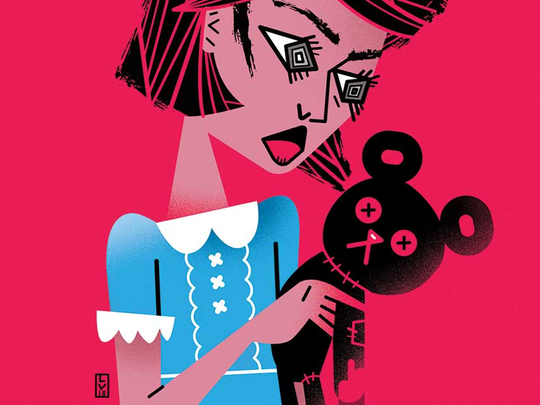
By Leila Slimani, Faber, 224 pages, £12.99
If you’ve ever been paid to look after someone else’s children — and I have — then you will know what a queasy, bittersweet transaction it is. A nanny wields such emotional power, despite a sometimes appalling lack of rights or status or future. And that’s without the guilt of working parents, desperate to do the right thing by their children (and themselves), yet doomed always to be anxious, suspicious, insecure and vulnerable.
It’s an explosive cocktail, and Leïla Slimani’s deft, often agonising novel shakes it up with a precision that takes your breath away.
Myriam and Paul are a successful, well-heeled Parisian couple — Paul a rising star of the music industry, his wife a lawyer, passionate about her career. When two children come along in quick succession, they convince themselves that life can — and will — carry on as normal. But stuck at home with the kids, Myriam fast loses her sense of self. When a friend offers her a job in his law firm, she knows she must go for it. But it can only work if reliable childcare can be found.
Enter Louise, an eerily ageless, doll-like widow who, with her prim Peter Pan collar, pink-painted fingernails, fastidious manner and unerring ability to entertain and enchant children, feels like the answer to their prayers. Before long she has made herself indispensable to the family, not only solving their childcare problems but also their housekeeping and cleaning ones. The couple cannot remember how they ever managed without this Mary Poppins figure in their lives.
It’s no spoiler to say that this is a murder story. We know from page one that both these very young children will be killed by their nanny. The precise details — a warm bath, a sharp ceramic sushi knife, the various neighbours who now convince themselves they saw something awry from the start — seep out with chilling slowness. But what we’re really waiting for is a motive, and Slimani ratchets up the tension by scattering clues, some so distressing that you read on with a genuine and mounting sense of dread.
An early scene where, playing hide-and-seek and remaining successfully hidden, the nanny spies on the children’s lengthy and drawn-out “anguish” and “panic … as if she’s studying the death throes of a fish she’s just caught”, makes for disturbing reading. But even darker is the later episode when, retrieving an old chicken carcass the mother has binned, the nanny teaches her charges to tear the dry meat off with their fingers, letting them drink “big glasses of Fanta as they ate, so they wouldn’t choke”. The whole idea is pretty macabre, but it’s the sly banality of the “glasses of Fanta” detail that makes it truly horrific.
But what raises this why-dunnit way above the usual killer-nanny thriller is that it’s also a fantastically well-wrought portrait of social, economic — and ultimately moral — distress and deprivation. In a series of flashbacks so vivid that I’m reluctant to call them that, Louise’s brutal, sometimes mentally unhinged past comes slowly to light. Domestic violence, unpaid bills, the almost-aborted daughter she could not bring herself to love: the Paris of Slimani’s story is a harsh, uneven and depraved city, corroded by poverty and sexual exploitation. Hardly surprising that the hapless, often immigrant childcare providers form an alienated underclass all of their own, with their “shameful secrets” and “humiliations”, not to mention the heart-sinking realisation that their charges will grow up to be people who neither care about, nor even recognise them.
Louise longs for that recognition. We learn that in all her life she’s never had a room of her own, nor once had a meal cooked for her. It makes a terrible kind of sense that this brutalised, displaced person has “only one desire” — a wish to “dig herself a niche, a burrow, a warm hiding place” within a real family. Knowing that Myriam and Paul’s kids will soon cease to need her, Louise becomes dangerously obsessed with the idea of her employer having another baby. When it becomes all too clear that this is not about to happen, she simply becomes dangerous.
Whether you believe this — and whether the crime ultimately makes sense — will depend on how convinced you are by Slimani’s prose (translated from the French by Sam Taylor). But what sublime prose it is. What appears at first to be a conventionally enough told tale soon gathers velocity, taking more and more risks as it gallops between viewpoints and tenses, introducing new and pungent characters to illuminate the narrative and seem absolutely relevant for a page or so before disappearing again. Some might find this tiresome, but I found it thrilling. And that’s without even mentioning the acid, throwaway beauty of so many of Slimani’s descriptions and phrases. The result is that you are taken deep into a fragile, damaged yet somehow rationally irrational psyche. I closed this book feeling very shaken but also with a sense that I’d just had an experience that almost no other art form could have given me. Long live the novel.
In November last year, President Macron apparently bestowed upon Slimani the job of “promoting the French language and its culture”. Quite what that means, I’m not sure, but he did good. I’d happily vote for any world leader who was moved by this intelligent and unerringly humane piece of work.
–Guardian News & Media Ltd









